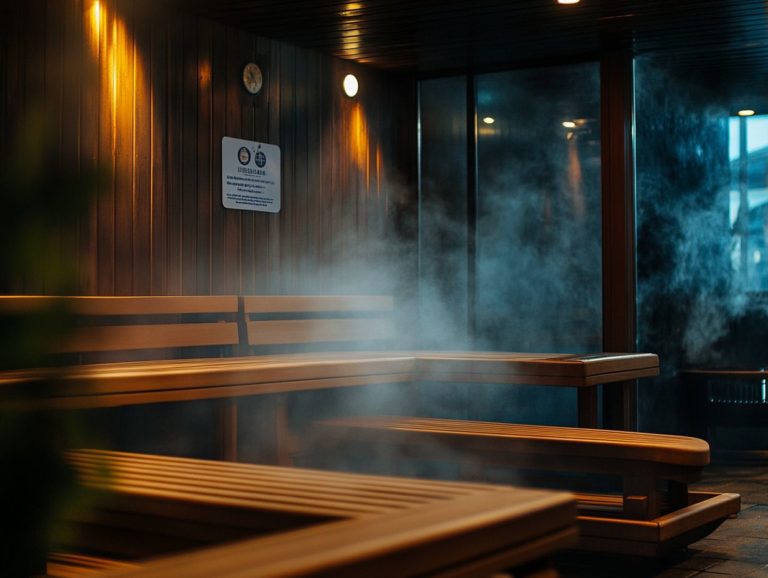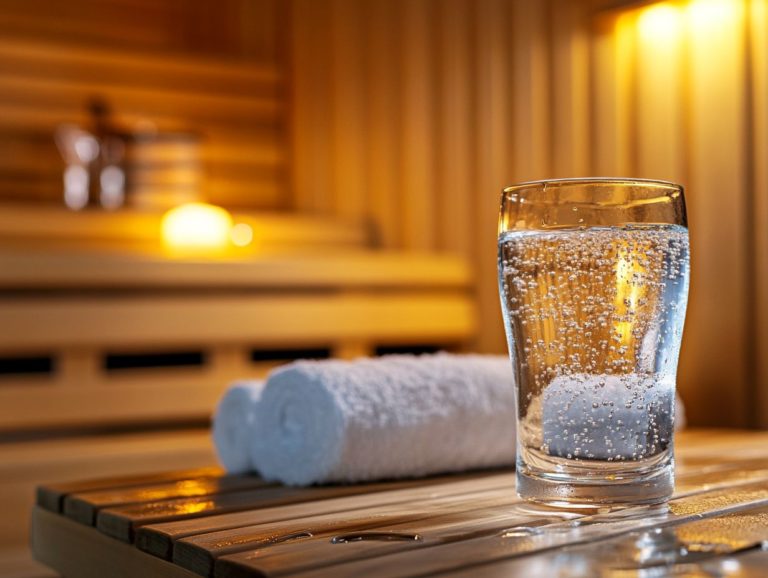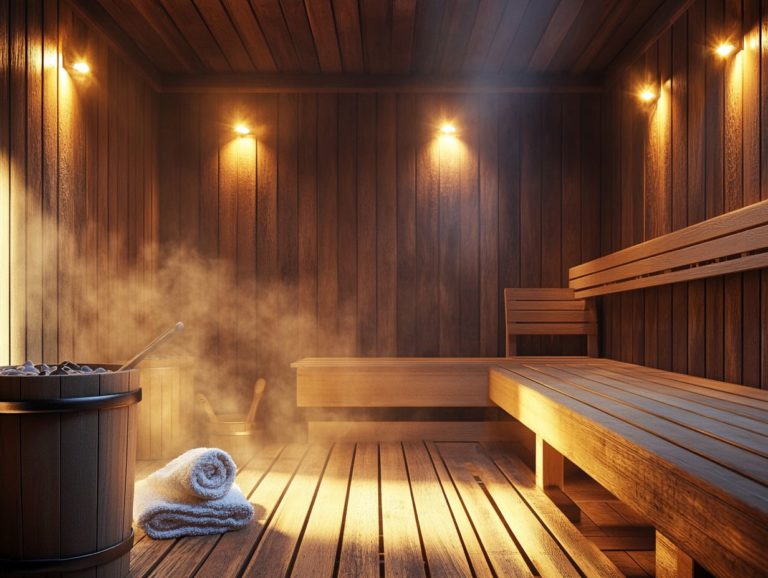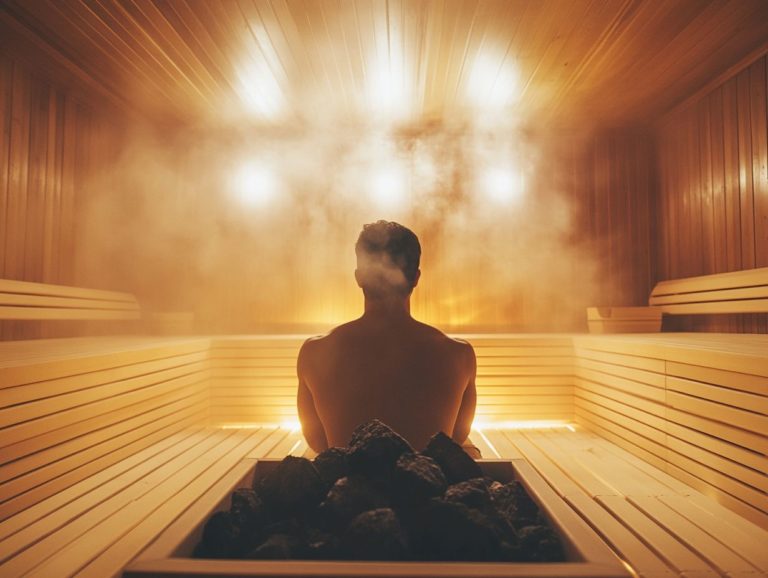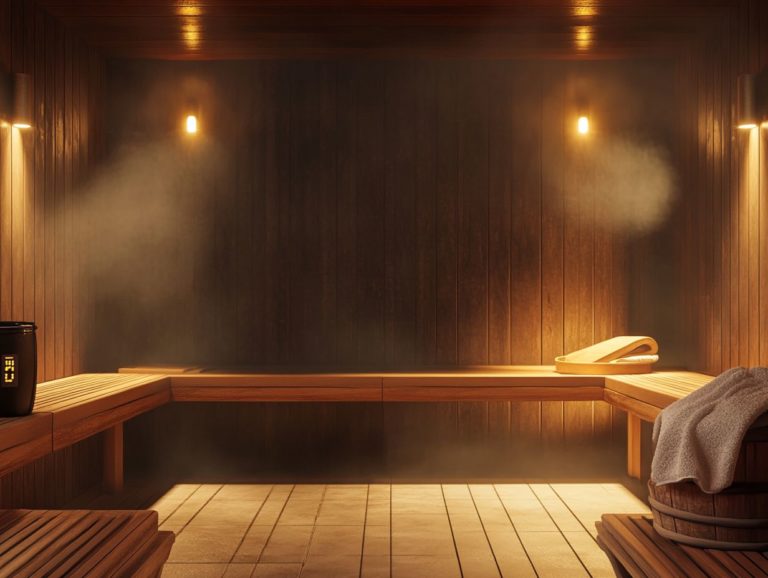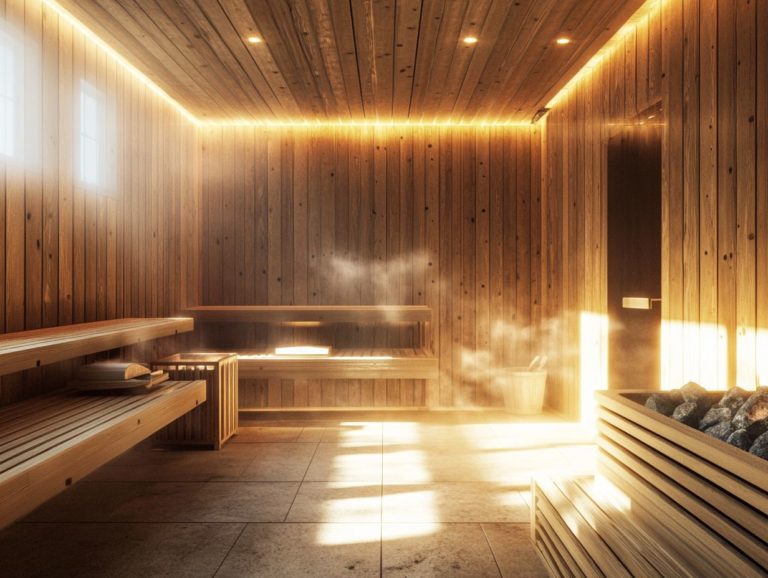Can You Bring Water into a Sauna?
Saunas have long been valued for their relaxation and wellness benefits. Many individuals are curious about the role of water in this steamy haven.
This article explores what a sauna truly is and how it operates, highlighting traditional and modern uses of water. It examines the advantages and risks associated with using water in your sauna experience and offers alternative methods to enhance your session without it.
Embark on this journey to discover how to maximize your sauna sessions!
Contents
- Key Takeaways:
- Understanding the Purpose of a Sauna
- The Role of Water in a Sauna
- Bringing Water into a Sauna: Pros and Cons
- Alternatives to Water in a Sauna
- Frequently Asked Questions
- Can You Bring Water into a Sauna?
- What are the Benefits of Bringing Water into a Sauna?
- How Much Water Should I Bring into a Sauna?
- What Type of Water Should I Bring into a Sauna?
- Are There Any Precautions to Take When Bringing Water into a Sauna?
- Can I Add Essential Oils or Herbs to the Water in a Sauna?
Key Takeaways:
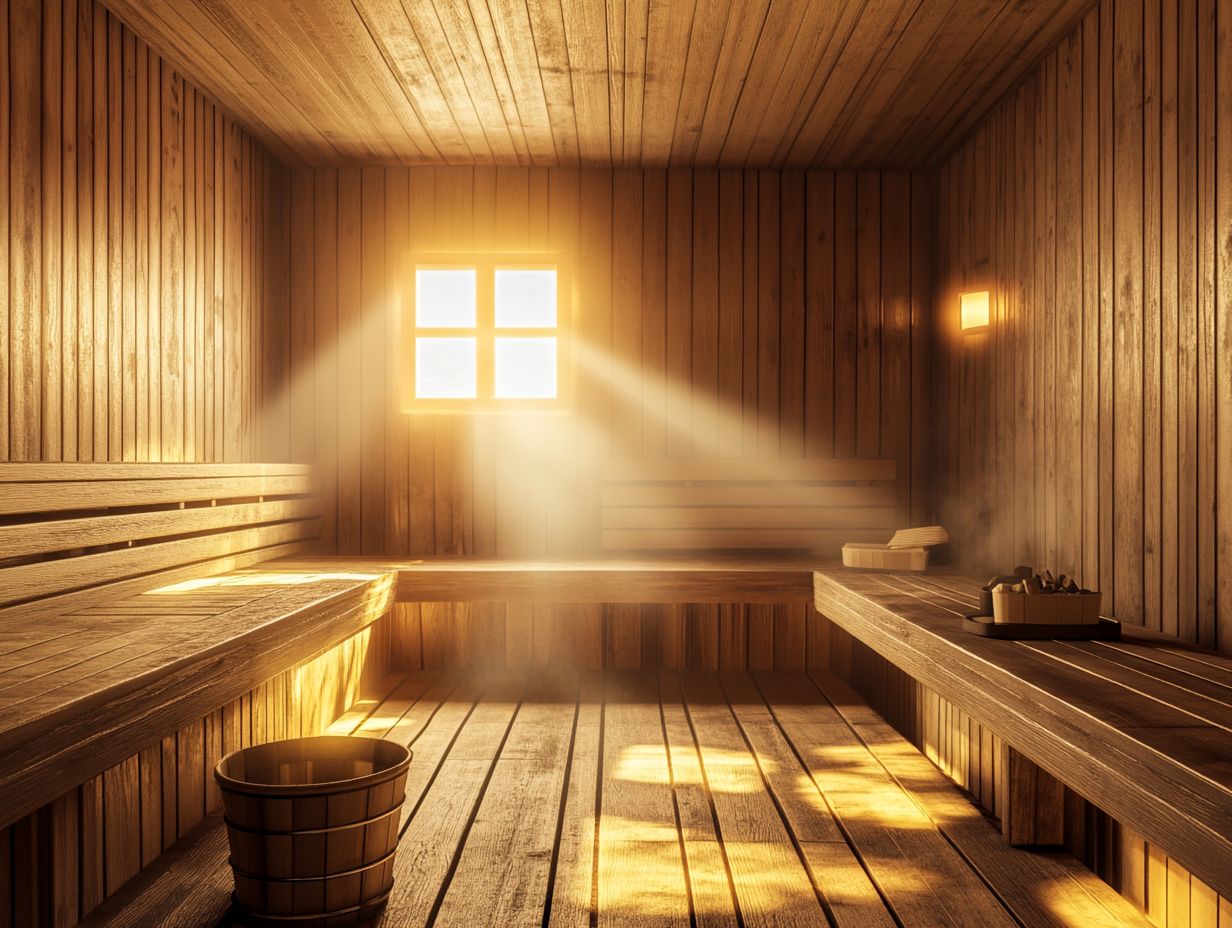
- Adding water to a sauna can enhance the experience and provide benefits such as improved blood circulation and relaxation.
- Bringing water into a sauna carries potential risks; precautions should be taken, such as avoiding pouring water on the heating element.
- If water is not your preference, you can enhance your sauna experience using essential oils or by incorporating music or meditation.
Understanding the Purpose of a Sauna
The purpose of a sauna goes beyond just sitting in a hot room; it has a long tradition of health benefits, social engagement, and personal wellness. Originating from Finland, the sauna experience immerses you in a heated environment that encourages sweating and relaxation.
As you explore the world of sauna enthusiasts, you’ll find numerous health advantages from enhanced circulation to a deep sense of relaxation for both body and mind. This timeless practice has become part of many cultures worldwide, elevating the sauna experience to something truly special when following the right sauna rules.
What is a Sauna and How Does it Work?
A sauna is more than just a hot room; it serves as your personal sanctuary for relaxation and wellness. Heated rocks craft a moist environment that invites you to sweat out the stresses of the day.
The essence of a sauna lies in its heating methods, whether through electric stoves or traditional wood-burning ones, both vital for achieving blissfully high temperatures. As the stoves warm up, they heat the rocks, radiating warmth and helping maintain a steady temperature throughout your session.
You might pour water over these rocks to elevate moisture levels, creating steam that enhances the heat and intensifies your experience.
This blend of heat and humidity sets the sauna apart, promoting detoxification and relaxation while boosting your cardiovascular health.
The Role of Water in a Sauna
Water is crucial to the sauna experience, elevating the ambiance with steam and creating a balanced, moist environment throughout each session. Maintaining these moisture levels is essential for comfort and relaxation.
Embracing this element enriches your time in the sauna and enhances the overall benefits, making every moment more invigorating and restorative.
Traditional Use of Water in Saunas
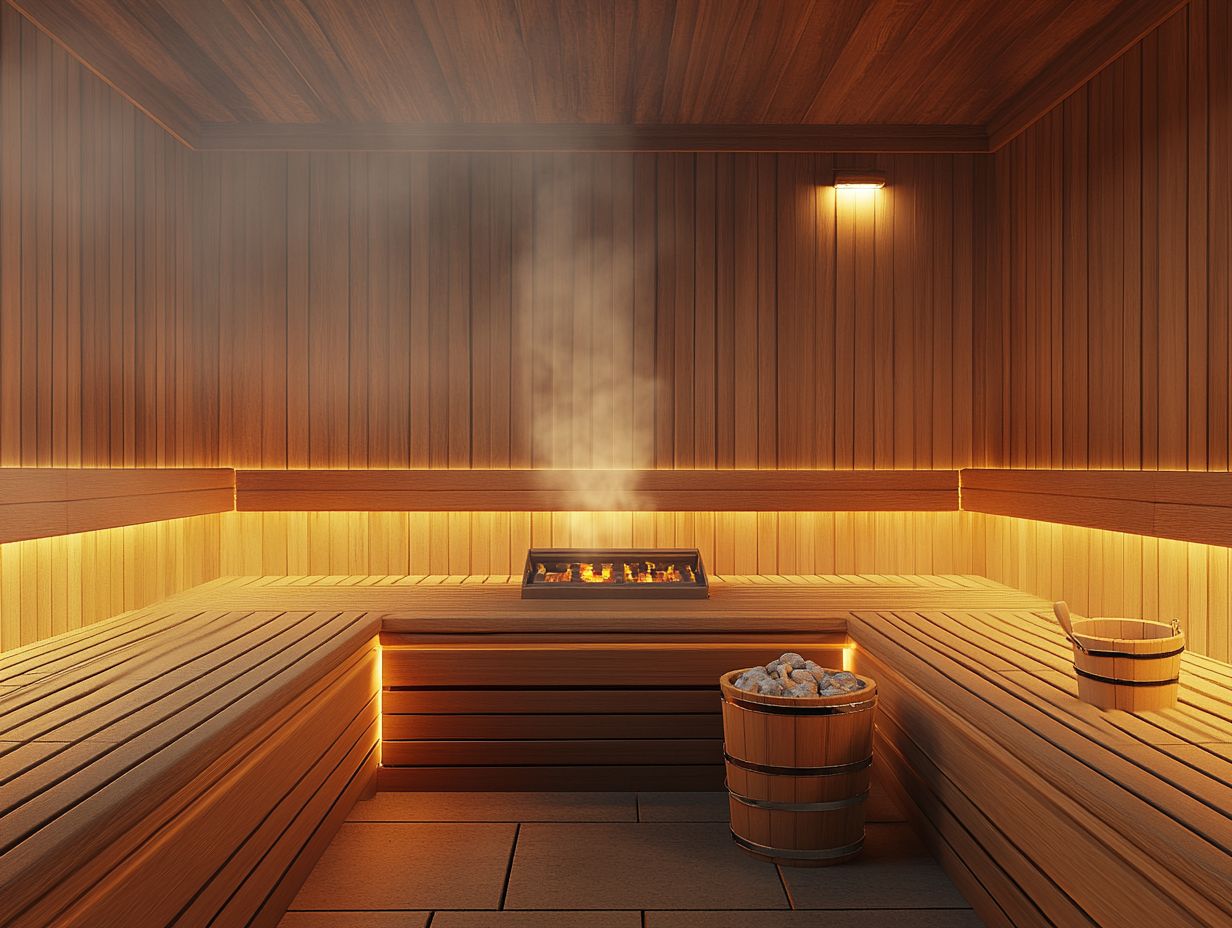
In traditional Finnish saunas, water plays a vital role in creating steam by being poured over heated rocks. This practice amplifies the sauna’s health benefits and enhances your overall enjoyment of the experience.
By hydrating those rocks, you elevate both the temperature and humidity levels, cultivating a soothing ambiance that’s essential for relaxation. For true sauna enthusiasts, understanding how this ritual impacts your time in this tranquil setting is key. The gentle hiss of steam invites you to fully immerse yourself in the experience.
It’s also vital to stay hydrated before and after your sauna session. The heat promotes detoxification through sweat, leading to significant fluid loss that needs replenishing. This mindful approach to hydration beautifully complements traditional sauna practices, emphasizing wellness and rejuvenation rooted in Finnish culture. Additionally, can you listen to music in a sauna can enhance your experience, making it even more enjoyable.
Benefits of Adding Water to a Sauna
Adding water to your sauna not only elevates moisture levels but also amplifies the myriad health benefits of the sauna experience, such as enhanced sweating and improved hydration!
When you incorporate water into your sauna sessions, you may notice a remarkable boost in your skin health. The increased moisture helps rejuvenate dry skin, promoting a more radiant complexion. Sweating acts as a natural detoxification method, efficiently flushing out toxins from your body while enhancing circulation. This can significantly benefit your heart health.
Staying properly hydrated is essential. It helps maintain your electrolyte balance and optimizes your body s temperature control. A well-hydrated sauna experience ensures you feel great and refreshed!
Bringing Water into a Sauna: Pros and Cons
Bringing water into a sauna presents both benefits and drawbacks. It’s crucial for you to thoughtfully evaluate how you manage hydration while enjoying your time in the heat.
Potential Benefits
- Bringing water into your sauna can unlock a range of potential benefits, enhancing your experience with improved sweating, hydration, and overall enjoyment.
- The steam created by introducing water promotes deeper breathing and further encourages relaxation.
- The added moisture positively impacts your skin, offering a rejuvenating effect that many sauna enthusiasts cherish.
- The warm, humid atmosphere stimulates circulation, helping to ease muscle tension and support recovery after workouts.
- This blend of warmth and moisture cultivates a serene environment, maximizing the therapeutic benefits of your sauna sessions.
Possible Risks and Precautions
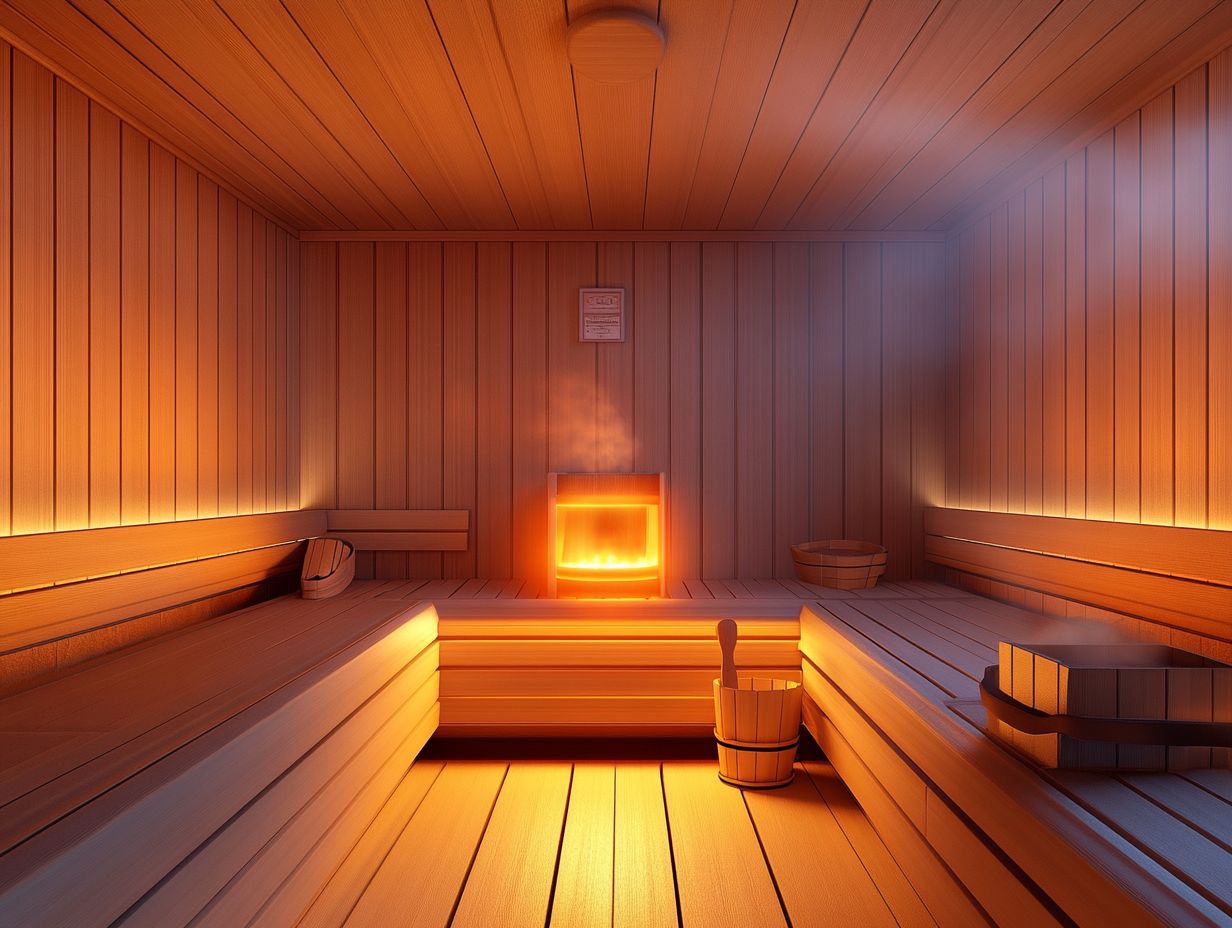
While adding water to a sauna can offer delightful benefits, it also comes with its own set of risks and precautions to keep in mind, such as potential discomfort from excessive moisture or pesky dry eyes.
Always ensure you have a bucket handy for controlled pouring. To truly savor the soothing experience, maintain a balanced moisture level that enhances relaxation without sacrificing comfort.
Proper sauna etiquette calls for mindfulness regarding each other’s space and preferences about humidity, making communication about water usage essential.
By implementing safety precautions like staying well-hydrated before entering and monitoring your time inside, you can significantly reduce potential risks. Additionally, knowing what to bring for safe sauna experiences can enhance your comfort. Tune into your body’s signals and respect the environment to elevate your sauna experience!
Alternatives to Water in a Sauna
If you re seeking to enhance your sauna experience beyond just water, there are plenty of methods available to improve your time in the heat without depending solely on moisture.
Other Ways to Enhance the Sauna Experience
Enhancing your sauna experience can be as simple as incorporating essential oils or herbal infusions. These not only add a delightful aroma but also bring a range of health benefits!
For instance, a few drops of lavender oil can calm the senses, while eucalyptus clears the airways. Adding these enhancements elevates the sensory journey, promoting a deeper sense of relaxation and rejuvenation.
Some enthusiasts even suggest including herbs like rosemary or chamomile in the water for steam infusion. These offer soothing properties that can significantly boost your overall wellbeing.
By exploring these diverse sauna tips, you can customize each session to perfectly suit your preferences. Transform your ritual into a truly immersive and rewarding experience that keeps both your body and mind in harmony.
Watch this video for more sauna tips!
Frequently Asked Questions
Can You Bring Water into a Sauna?
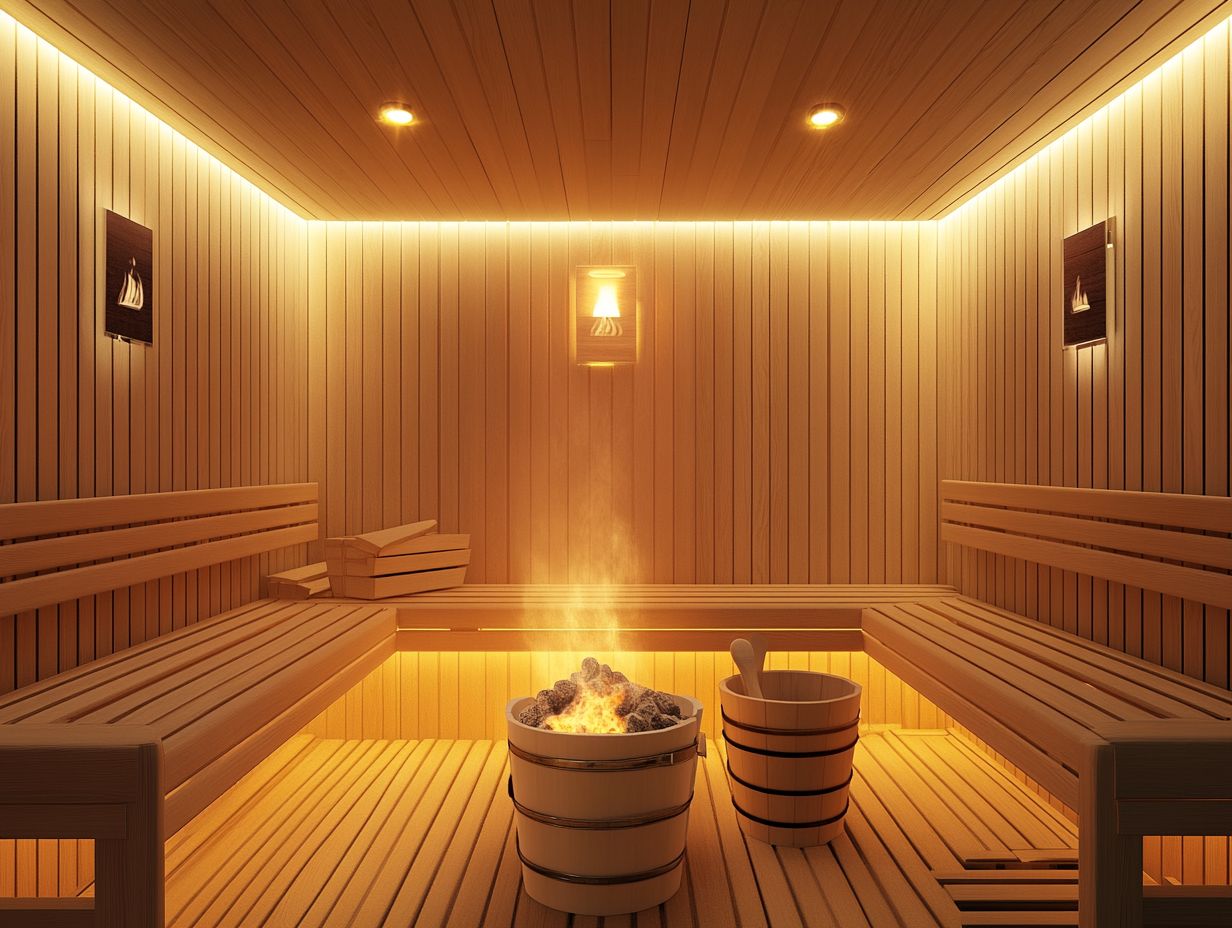
Yes, you can bring water into a sauna. Just do it safely and in moderation.
What are the Benefits of Bringing Water into a Sauna?
Bringing water into a sauna increases humidity. This will make your time in the sauna even better and provide health benefits like improved skin hydration and relaxation.
How Much Water Should I Bring into a Sauna?
Bring a small amount, usually a few cups. This keeps the sauna’s heating system from being overwhelmed.
What Type of Water Should I Bring into a Sauna?
Purified or filtered water is best. It s free from impurities or chemicals that could be harmful when heated.
Are There Any Precautions to Take When Bringing Water into a Sauna?
Always use a heat-resistant container, like a sauna bucket. Pour the water carefully onto the sauna rocks or benches to prevent splashing or burns.
Can I Add Essential Oils or Herbs to the Water in a Sauna?
Yes! Adding a few drops of essential oils or dried herbs can create a lovely aroma. Ensure you choose oils and herbs that are safe in high heat.

